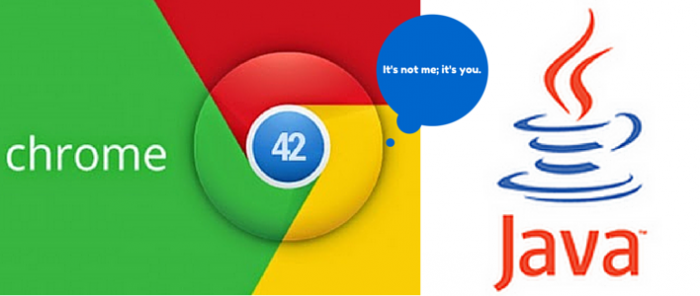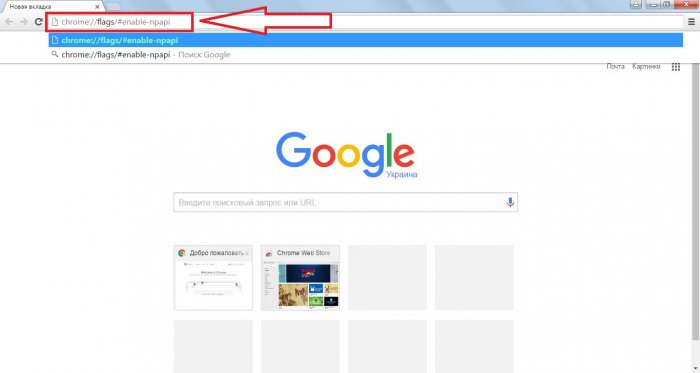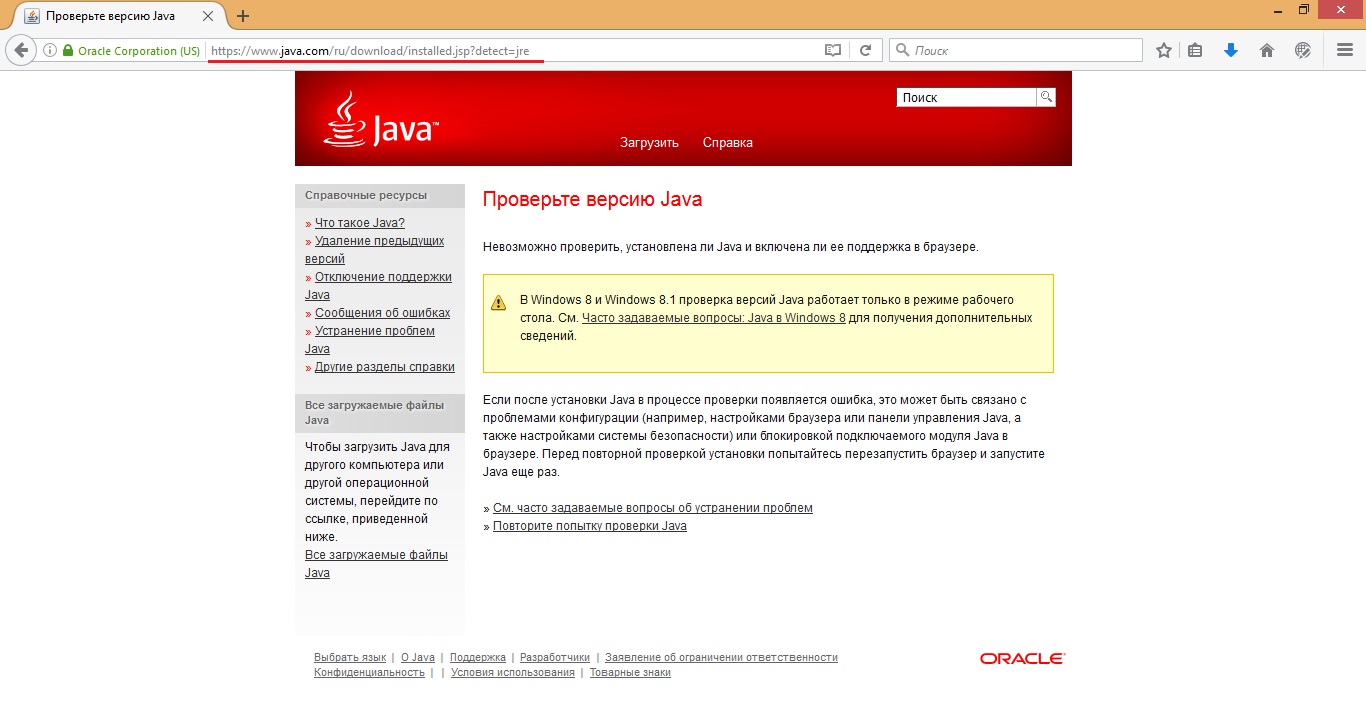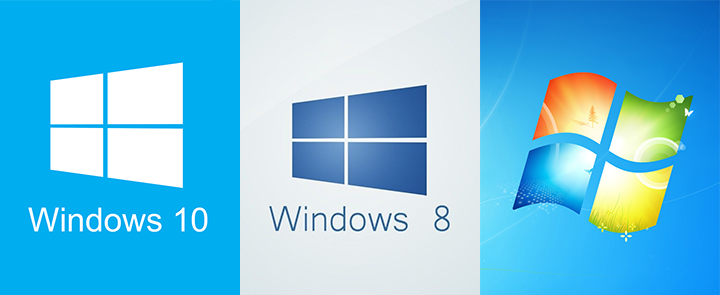Java plugin. Java plugin not working in Firefox after installing Java
Some versions, apparently by mistake, Google chrome, do not support Java, which raises the question of how to enable Java in Chrome?
Why do this? - Yes, everything is simple, a man in the street wants to enter the network and watch some videos, or play a game, but he cannot do this, and that's all because Java is not connected. This phenomenon is common in older Chrome versions.
It is not difficult to do this, you do not have to install the browser over a new one. Below are the solutions to this problem.
1. Why Java is missing from Chrome
In 2015, Google dropped support for NPAPI browsers. This architecture, which is used by many plugins, and essentially all Java.Therefore, most of the videos or games do not work for google version Chrome is over 15 years old.
But there is a way out, and it consists in turning on the disabled support for NAPI in GH. And it's not difficult to do this.

2. How to enable Java in Chrome
Several steps to solve this problem:1. Launch the browser. Further actions we produce it in a running browser on a PC.
2. In the line “ Url", Enter the following value: chrome: // flags / # enable-npapi, right in the place of the address bar.

3. Now a new item will open, it is associated with NPAPI... Below the item is marked with a red line. Most often it looks like this, but there are other variations.

That's all, Java should now work in the browser.
Since NPAPI is located in the "experimental" features section, it is activated at the user's own risk. In general, on the inclusion page itself there is a sub-clause about this.
3. Turning on does not help
The reasons for this:
- the required plugin does not function;
- there is no plug-in in general;
- Java version requires an update.
That's all possible reasons, other problems were not encountered by users, except that such a reason may be a problem with the characteristics of the PC. Well, or viruses prevent you from fully functioning. Scan the system and remove unwanted software.
Plugin disabled
Let's work out how to see whether the plugin is enabled or not. Go to the "Extensions" section in chrome.This is done through the settings, or the address bar, in which you will need to enter: chrome: // plugins /.

If everything is working properly, try putting a tick in the "Always run" checkbox. Thus, the plugin will function immediately upon launching the browser.
Download Java plugin
Java can be downloaded from its official website - java.com. The site, in theory, will independently translate the page into the desired (Russian language)Go to the "Download Java" section on the website and start downloading.

After downloading, install the plugin. The whole installation takes place in automatic mode... After it finishes, restart your computer and enter the browser. Everything.
Java is mainly used for online games... To start correctly, you need to install it correctly and update it from time to time. It should also be remembered that Java is a programming language.
To install it, simply visit the developer's site and download (java.com). There we confirm the user agreement and download. By the way, it's completely free, you don't have to pay for downloading and there are no hidden fees.
After downloading the application to your computer, close the smear and other browsers you are using. Only after closing all browsers, start installing the application.
Update
After downloading and Java installations install it automatic update... The program itself will check for updates and notify you about it. You can change the update settings in the Update tab in the control panel.
There you can also check for updates manually, but it is more convenient, of course, to allow the program itself to do this. Do not forget to delete old versions of Java application after updating - this will help save space on your hard disk and eliminate possible threats to the security of your personal computer. 
How to check the functionality of this application
Everything is very simple, to check it just go to the testing pages:
It will not take more than ten minutes of your time, but you will find out if this program works for you.
Correct inclusion of this application
Enabling Java does not present any problems. Just follow the instructions and you will succeed:

Troubleshoot application problems
There are several reasons why a plug-in program may stop working. Let's consider the most basic ones:

Removing Java plugin
Choose your operating system and strictly follow the directions.
- In the "Start" select "Control Panel".
- Find the "Remove Programs" tab.
- We select the program and click "Delete" and confirm our action.
- Open "Start" as standard.
- Next comes the "Control Panel".
- Then "Programs".
- And the last "Programs and Features", there we select the application and uninstall.
- We go to "Start".
- Further "Settings".
- There we find "System".
- "Applications".
- Select the program that you decided to delete (in our case Java), click on it and the "Delete" button.
Many Internet users are often faced with the fact that the drop-down menu does not work on the sites, videos do not play, nothing happens when buttons are pressed, etc. Or, for example, pictures are not shown, but instead the inscription appears: “This plugin contains security vulnerabilities. Click here to enable the Java (TM) Platform SE 7 U Plugin. " All this is due to the work of the Java plugin, which is present in browsers.
In some browsers Java is preinstalled, in some it has to be downloaded separately. But even if this plugin is installed in your browser, it is not a guarantee that it will work, because sometimes the Java plugin needs to be enabled.
If you encounter any problems displaying web pages, check do you have Java plugin enabled... To make it easier for you to do this, I wrote a small script that checks the browser and displays the appropriate inscription. Here is the analysis result for your browser:
Javascript is DISABLED in your web browser If it says above that JavaScript is enabled, then everything is fine, otherwise it must be enabled. The procedure is slightly different for each browser, so let's focus on each of them.
1) Go to the "Settings" section
2) Go down to the bottom of the page and click on the link "Show advanced settings"
3) Press the button "Content settings"
4) In the "JavaScript" section, activate the item "Allow all sites to use JavaScript"
5) Click "Finish"
Attention! Since April 2015 in new versions Chrome browser Java plugin is disabled by default! How to fix it, !
1) Press the key combination "Alt + X"2) In the menu that opens, select the item "Browser Properties"
3) In the "Security" tab, click the "Other" button
4) Find the item "Execute Java application scripts" in the list and activate the item "Enable"
5) Click "OK"

Opera
1) Press the key combination "Ctrl + F12"
2) In the "Content" section, activate the item "Enable JavaScript"
3) Click "OK"

1) Press the key combination "Ctrl + Shift + A"
2) Go to the "Plugins" section
3) Opposite the Java (TM) Platform module, put the switch in the "Always enable" position
4) Close the "Add-ons Management" tab

Apple Safari
1) Press the key combination "Ctrl +,"
2) Go to the "Security" tab
3) In the section "Web content" activate the options "Enable Java" and "Enable JavaScript"
4) Close the window

Now you know not only how to check if JavaScript is working in your browser (just open this article and read the result), but also how to enable Java in Firefox, Chrome, IE, Opera and Safari!
This section concerns:- Browsers: Firefox
- Java versions: 7.0, 8.0
Firefox browser has limited support for NPAPI technology for Java applets
64-bit Firefox
The 64-bit version of Firefox does not support NPAPI plugins, including Java.
Firefox 52 and later
Firefox 52 (March 2017 release) only supports plug-in Adobe flash... The browser will no longer support NPAPI technology, which will affect plugins for Java, Silverlight, and other NPAPI-based modules.
If you have problems accessing Java applications in Firefox browser, Oracle recommends switching to browser Internet Explorer(Windows) or Safari (Mac OS X). Developers and sysadmins who need alternative ways For Firefox user support, we recommend that you refer to this blog about Launching Web Start Applications.
Firefox 52 ESR Release 32-bit
Temporary solution
Below are some workarounds. The first is the most the simplest way, we recommend that users do just that. The rest of the methods are not recommended for users with no technical knowledge.
Option 1 (simplest)
Add the property name dom.ipc.plugins.java.enabled to Firefox settings
- Start Firefox.
- Enter about: config in the address bar.
- A Firefox warning appears about the risks of changing configuration settings. Confirm this message, a list of configuration settings will be displayed.
- Click right click mouse over the displayed list of settings. Please select Create then select Logical.
- Add the property name dom.ipc.plugins.java.enabled
Add the customization name dom.ipc.plugins.java.enabled. - A window will open, select in it false... Then press OK.
Option 2
Creating a "user.js" file with a customization record
The instructions are based on the information contained in the Mozilla links below.
- Use a text editor to create the "user.js" file in the Firefox profiles folder
- Add an entry:
Option 3
Updating the setting entry in the "pref.js" file
- Navigate to the "pref.js" file in the Mozilla Profiles folder
- Find and update the setting
user_pref ("dom.ipc.plugins.java.enabled", false);
Resource Links for Mozilla
Firefox warning: add-ons can cause problems
When Firefox starts up, the following warning message is displayed:Firefox has determined that the following add-ons may cause instability or security issues
Cause
Older versions Java package The Deployment Toolkit (DT) and Java plug-in are disabled by Firefox. Some versions available Java browser Firefox may display the message "Add-ons may be causing problems."
If Firefox suspects an add-on is unsafe and could pose a security risk, it will block the download. In the event of a soft block, Firefox will display a warning message, but allow the user to continue downloading if necessary. At the same time, security is reduced. In case of hard blocking, Firefox will block the installation, preventing the user from using this add-on. To solve this problem, the user must update the Java platform to latest version.
Temporary solution
Updating to the latest Java version will help fix this issue. If a warning is displayed, do the following:
- Make sure Disabled is selected.
- Click the Restart Firefox button.
- Download the latest Java version. ...
Java not working in Firefox due to offline JavaFX installation
After completing the installation of Java 7u10 and later, the following error message is displayed:Error: A plug-in is required to display this content. Install the plug-in
Cause
This may be due to a conflict between Java 7u10 and later and JavaFX standalone installations. Example: if Java 7u5 and JavaFX 2.1.1 are installed, when upgrading Java Firefox cannot detect installation new version Java.
Java is a programming language and computing platform first released by Sun Microsystems in 1995. This is the underlying technology on which many are based. modern programs(including utilities, games, and business applications). Java is powered by over 850 million personal computers and on billions of devices (including mobile phones and televisions) around the world.
Why do you need Java?
There are many applications and websites that will only work if you have Java installed. Java is fast, secure, and reliable. Java is used everywhere: from laptop computers to data centers, from game consoles to scientific supercomputers, from mobile phones to the Internet!
Installing Java.
Installation is absolutely free, from the official website of the resource: www.java.com
Required software:
Platform / Platforms: Windows 7, Vista, Windows XP, Windows 2000, Windows 2003
Browser (s): Internet Explorer, Firefox, Chrome
SYMPTOMS
Applets won't launch even after installing Java.
CAUSE
Java support is not enabled in the browser. If java environment already installed, but applets won't launch, you might need to enable Java in your browser.
SOLUTION
To enable Java in your browser, follow the instructions below:
Internet Explorer
Click Tools and then Internet Options
Go to the Security tab and click the Custom button
Scroll down to Execute Java Application Scripts
Make sure to click the Enable switch
Click OK to save the settings.
Firefox
Run Mozilla browser Firefox or restart it if it was running
At the top of your browser, click Firefox (or go to the Tools menu in Windows XP) and then to the Add-ons section
The Add-ons Manager tab opens.
On the Add-ons Manager tab, select Plugins
Click to connect Java module(TM) Platform to select it
Click the Enable button (if the button says Disabled, then Java is already enabled)
Chrome
Click the wrench icon and select Options.
Go to the Advanced tab and then "Privacy" Content Settings….
The content settings panel will open.
In the Plugins section, click the Disable individual modules ... link to check that Java is enabled
Click the Enable link (if the Disable link appears, Java is already enabled)
Note: You can also access plugin options by typing about: plugins in address bar browser.
Opera 4.x and higher
V Opera browser for Windows environment Java is not used, but Opera already has a built-in version.
Opera for other platforms may support Java. See the documentation for your Opera platform for details.
That's all!
I wish you success in your NET endeavors!

 Odnoklassniki: Registration and profile creation
Odnoklassniki: Registration and profile creation E is. E (functions E). Expressions in terms of trigonometric functions
E is. E (functions E). Expressions in terms of trigonometric functions Social networks of Russia Now in social networks
Social networks of Russia Now in social networks